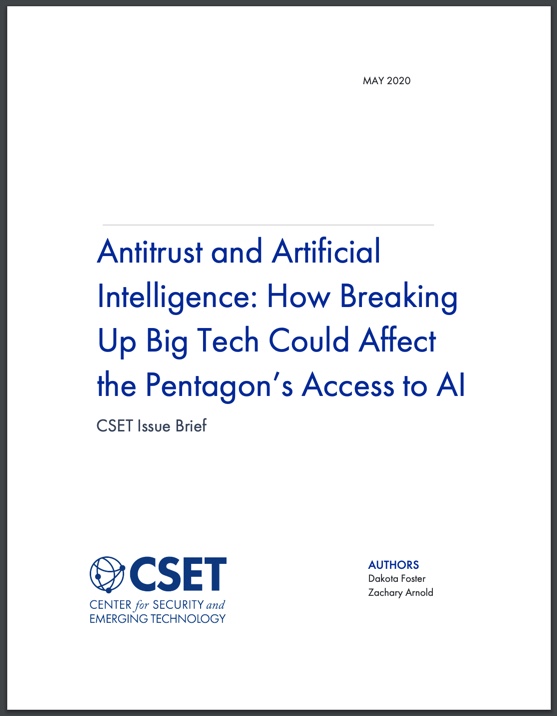Artificial intelligence stands to play an important role in America’s defense posture in the coming decades. The Pentagon has identified AI as a critical technology for national security and is working to acquire and deploy AI tools across its operations.
Unlike with many prior defense technologies, the private sector currently drives the development of AI. Therefore, to use AI to America’s national security advantage, the Pentagon will rely in large part on the domestic private-sector AI ecosystem. At the same time, antitrust policymakers are contemplating significant changes to this ecosystem, and are even considering breaking up its largest companies. How would such an action affect the Pentagon’s AI capabilities?
In this paper, we offer an initial framework for understanding this question. We explore three ways in which breaking up Big Tech could affect the Pentagon’s access to cutting-edge AI technology, outlining potential risks and benefits in each case and proposing questions for further research. Our goal is not to answer these questions, but instead to frame specific topics for policymakers and researchers to explore.
Our first and most central consideration is innovation. Large tech companies control many of the key inputs fueling domestic AI innovation, including data, compute (computing power), and talent. The Pentagon stands to benefit from this innovation both directly—by buying products from large, consumer-oriented companies like Google and Microsoft—and indirectly, as traditional defense contractors, military-focused startups, and Department of Defense (DOD) researchers develop AI tools derived from the consumer market. If antitrust action creates a less concentrated AI ecosystem composed of smaller companies, would the U.S. AI sector become more or less innovative on the whole? And would its innovation be more or less oriented toward the Pentagon’s specific needs? Key considerations around these questions include the diversity and quantity of data held by big companies; the relationship between firm size, R&D, and innovation; and the effect of scale on talent acquisition, collaboration, anti-competitive practices, and compute.
The private sector currently drives the development of AI. Therefore, to use AI to America’s national security advantage, the Pentagon will rely in large part on the domestic private-sector AI ecosystem.Dakota Foster and Zachary Arnold
Second, we consider the Pentagon’s acquisition process. While direct contracting with leading tech companies—as exemplified by Project Maven (Google) and Project JEDI (Microsoft)—is not the only mechanism for private sector/DOD AI collaboration, we expect it will play a significant and increasing role. If tech giants are fractured through antitrust action, how might this mechanism evolve? Will smaller AI companies be in a better or worse position to partner with the Pentagon? Key factors to consider here include barriers to entry for Pentagon work and the draw of international markets.
Third, we consider containment. Even if the private sector produces innovative, strategically important AI tools and the Pentagon manages to acquire them, it will need to keep those same tools out of the hands of U.S. adversaries in order to maintain a strategic advantage. Will this process be harder or easier if America’s largest AI companies are broken up? Will the Pentagon have those tools to itself? Our framework focuses on cybersecurity as one key factor to consider.
